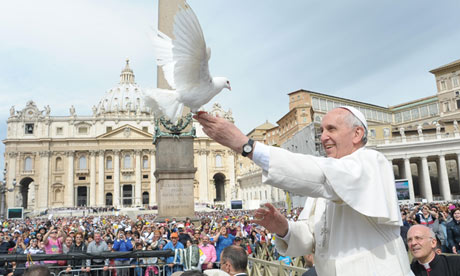Pope Francis attacks 'cult of money' in reform call
Pontiff says politicians need to be bold in tackling the root causes of the economic crisis

Pope Francis said the root causes of the economic crisis lay in
acceptance of money's power over society. Photograph: -/AFP/Getty Images
acceptance of money's power over society. Photograph: -/AFP/Getty Images
Pope Francis has hit out at unbridled capitalism and the "cult of money", calling for ethical reform of the financial system to create a more humane society.
In an impassioned appeal, the Argentinian pontiff said politicians needed to be bold in tackling the root causes of the economic crisis, which he said lay in an acceptance of money's "power over ourselves and our society".
"We have created new idols," he said in a speech in the Vatican. "The worship of the golden calf of old has found a new and heartless image in the cult of money and the dictatorship of an economy which is faceless and lacking any truly humane goal."
Attacking unchecked capitalism, the pope said the growing inequality in society was caused by "ideologies which uphold the absolute autonomy of markets and financial speculation, and thus deny the right of control to States, which are themselves charged with providing for the common good".
Francis, who as a priest in Buenos Aires experienced his country's financial crisis, has made the rejection of riches and luxury the hallmark of his two-month pontificate. Days after his election as the Roman Catholic church's first non-European pope, he spoke of his desire for a "poor church".
On Thursday, he said: "A new, invisible and at times virtual, tyranny is established, one which unilaterally and irremediably imposes its own laws and rules."
Ethics, he said, were too often dismissed as a nuisance. "There is a need for financial reform along ethical lines that would produce in its turn an economic reform to benefit everyone," he said. "Money has to serve, not to rule."
The Vatican's own source of economic strife, the once scandal-ridden Institute for Works of Religion (IOR) commonly known as the Vatican Bank, is itself reportedly preparing to implement certain reforms to put its troubles behind it.
Vatican Radio said the bank's new president Ernst von Freyberg told employees the institution was to launch its own website and publish an annual report in a bid to enhance transparency.
In an impassioned appeal, the Argentinian pontiff said politicians needed to be bold in tackling the root causes of the economic crisis, which he said lay in an acceptance of money's "power over ourselves and our society".
"We have created new idols," he said in a speech in the Vatican. "The worship of the golden calf of old has found a new and heartless image in the cult of money and the dictatorship of an economy which is faceless and lacking any truly humane goal."
Attacking unchecked capitalism, the pope said the growing inequality in society was caused by "ideologies which uphold the absolute autonomy of markets and financial speculation, and thus deny the right of control to States, which are themselves charged with providing for the common good".
Francis, who as a priest in Buenos Aires experienced his country's financial crisis, has made the rejection of riches and luxury the hallmark of his two-month pontificate. Days after his election as the Roman Catholic church's first non-European pope, he spoke of his desire for a "poor church".
On Thursday, he said: "A new, invisible and at times virtual, tyranny is established, one which unilaterally and irremediably imposes its own laws and rules."
Ethics, he said, were too often dismissed as a nuisance. "There is a need for financial reform along ethical lines that would produce in its turn an economic reform to benefit everyone," he said. "Money has to serve, not to rule."
The Vatican's own source of economic strife, the once scandal-ridden Institute for Works of Religion (IOR) commonly known as the Vatican Bank, is itself reportedly preparing to implement certain reforms to put its troubles behind it.
Vatican Radio said the bank's new president Ernst von Freyberg told employees the institution was to launch its own website and publish an annual report in a bid to enhance transparency.